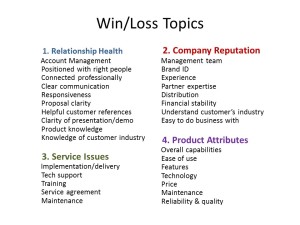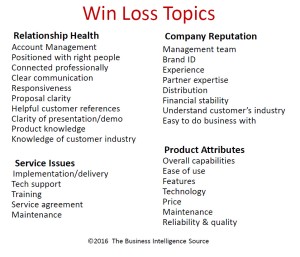Early this week Amy Cuddy presented her book, Presence, at our Denver independent bookstore, Tattered Cover. Here are some of my favorite nuggets from Presence, and how they relate to primary research and Win/Loss analysis interviewing.
Presence has a number of definitions in Amy’s book.
“Removing judgment, walls, and masks so as to create a true and deep connection with people and experiences.” Pam, Washington State
“Being myself and keeping confident, whatever happens.” Abdelghani, Morocco
“Confidence without arrogance.” Rohan, Australia
“When all your senses agree on one thing at the same time.” Majiid, United Arab Emirates
So let’s interpret presence in primary research—such as Win/Loss interviews—where you had better be present. Not only do you need to be prepared with the questions you want answered, you need to be you: a confident interviewer, who expects the other person to be responsive, while being polite and not arrogant. You need to listen with all your senses.
This is challenging, as primary research is often done over the telephone so there is no body language to read. But you do have words, intonation, pauses, changes of tone, breathing, and facial expressions that you can sense like a smile or a frown as people talk. You also have your intuition to tap into.
William (Bill) Ury, world famous negotiator, cofounder of Harvard ‘s Program on Negotiation, and author of the decades old acclaimed book, Getting to Yes, offers great advice.
“When you listen to someone, it’s the most profound act of human respect.” Bill Ury.
Marianne Williamson adds to this, “As we let our own light shine, we … give other people permission to do the same. As we’re liberated from our own fear, our presence automatically liberates others.”
Why is it so hard to be quiet and listen? When we meet someone for the first time, we fear we won’t be taken seriously. So we talk first. We want to show what we know, what we think and what we have accomplished. Talking first says I know better than you. I am smarter than you. I should speak while you listen.
When I let you talk first, who knows what you’ll say? I am giving up control of the situation, and where will that leave me?
Listening is difficult at times and the eagerness to reach a quick solution can take over, when in negotiations like Bill Ury. Bill says look for the present moment. In most situations, there is an opening if we are attentive enough to see or hear it. It is all too easy to miss since we may not be paying full attention. It is easy to be distracted thinking about some past event or worrying about a future one. Yet it is only in the present moment that we can change the direction of a conversation (towards agreement…Bill Ury).
This is also true in Win/Loss interviews. You need to be sensitive as to what the interviewee knows and what they don’t know. While your company wants answers to 10 questions, for example, the interviewee may only be knowledgeable and willing to share on 5 of them, and two of them in great depth. As the interviewer you need to be present to pick up on the cues to probe more deeply, and to pass over quickly those questions that the interviewee doesn’t know the answer to or won’t share.
Real listening is crucial to presence. But it can’t happen unless you have a real desire to understand what you’re hearing. This means you have to suspend judgement, even if you’re bored, scared, anxious, impatient, frustrated or feeling threatened. Give the other person the space and safety to be honest. You can’t respond defensively when you’re truly listening. This also means you need to overcome the fear of silence as you let the other person speak their mind.
Remaining silent is one of the main behaviors of a good interviewer. You want the interviewee—in the case of Win/Loss—the customer or former prospect to do the talking. They need to feel comfortable when you are silent that you are giving them time to think, and are listening to what they’re saying. That’s why mirroring or a simple, “uh huh” encourages the interviewee to continue sharing.
By listening, which is viewed by many as relinquishing power, you become more powerful. When you stop talking and listen, you can expect:
- People will trust you.
- They will feed you useful information.
That’s what you are looking for in a Win/Loss interviewer, that they will build trust almost instantly so the customer or former prospect will share how they went about making their buying decision, and for example, what variables would have changed their buying decision, if any.
When people feel heard, they are more willing to listen.
You value this as an interviewer as well since you want people to answer your questions honestly. Once they feel heard, they will listen more closely as you probe more deeply into some of the issues where you sense they know more.
Meanwhile keep in mind that listening to another person does not guarantee a favorable outcome every time. Part of presence is accepting the possibility of disappointment, and moving on.
In Win/Loss interviews, not everyone is going to give you great information. In fact, some won’t agree to be interviewed. In my experience, everyone you interview shares some valuable information. However, about a third of them share the most insightful information. In primary research, we often cold call, so we experience even more disappointment when people are unresponsive and/or don’t take our calls. It’s good to keep in mind that you can always find another person who has the knowledge and willingness to help you. You just need to be persistent.
I love this from Maya Angelou:
“Stand up straight and realize who you are, that you tower over your circumstances.”
Oh yes, I recommend you buy a copy of Presence.
Check out our book, Win/Loss Analysis: How to Capture and Keep the Business You Want.
Connect on LinkedIn Connect on Twitter
Filed under: Cooperative Intelligence, primary research, win loss analysis | Tagged: human relationships, interviews, loss analysis | Comments Off on Reflecting on Present Moments with Amy Cuddy





 Since people often disconnect for Q&A, I am including the second group of them here. (
Since people often disconnect for Q&A, I am including the second group of them here. (

